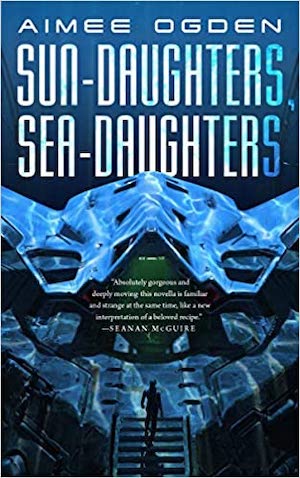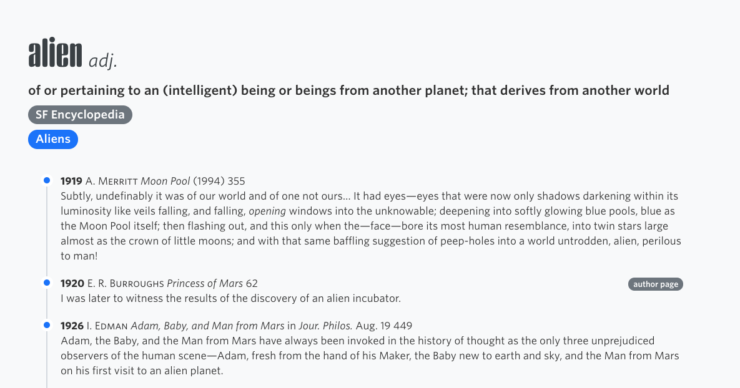It’s happened to me over the years: I’ll come across a term in a book that’s clearly a word that emerged out of the science fiction canon, and I’ve wanted to see how it’s been used over the years.
There’s now a new online resource designed to help with that: The Historical Dictionary of Science Fiction.
The crowd-sourced project comes from Jesse Sheidlower, a former editor-at-large from the Oxford English Dictionary—it originated as an OED initiative, and is now a standalone site. The dictionary is designed to not only put definitions to the genre’s terminology, but to show how those words have been used over time.
Buy the Book


Sun-Daughters, Sea-Daughters
“The goal of historical lexicography is to find examples that show exactly how a word has been used throughout its history: how long it’s been around (twenty years? two hundred? a thousand?), who has used it (newspaper reporters? scientists? theologians? farmhands?), in what contexts it’s been used (formal sources? playground speech? science fiction?), etc.”
Sheidlower told The New York Times that the language of science fiction has permeated our dialog: “Despite the fact a lot of people look down on science fiction as genre, it’s everywhere, and there is a very interesting crossover between science fiction and science.”
The OED’s efforts to document science fictional language has been around for more than a decade. According to the site, Sheidlower started the Science Fiction Citations Project while running the OED’s North American Reading Programme, along with volunteers Mike Christie and Sue Surova.
“The idea for a collaborative site began when Sue posted a message on a Usenet discussion group looking for early examples of the SF usage of mutant ‘a being that has arisen by genetic mutation, esp. one with freakish or exceptional anatomy, abilities, etc.’. The earliest example the OED had for this sense was 1954, but OED editors knew the word must have been used earlier. A 1938 quotation was quickly found, and a plan for further research was formed. (Since then, we have improved on this with a 1934 example; see the entry for mutant n.)”
The initiative grew beyond just a survey of science fictional words, and eventually helped lead to the OED’s science fiction dictionary, Brave New Words (an indispensable resource!) in 2007. Sheidlower notes that contributions to the project tapered off in 2010, and stopped when he left the OED. In 2020, he got permission to restart the project, and launched it as a standalone website, and has begun to work on building it up, with help from the Internet Speculative Fiction Database and the Internet Archive, which has scanned thousands of old pulp magazines.
The site is now up and running, and at the moment, features hundreds of terms for fans and readers to look up. Each term features both a definition and a timeline, which documents the various times that a word has been used, along with a quote. The term “Android” for example, is defined as:
“a robot or other artificial being made to resemble a human, esp. one made of synthetic flesh or a fleshlike material (in contrast to metal, plastic, etc.)”
The page for the term reveals that it was first used in 1936 by Jack Williamson in his Astounding Science-Fiction story “Cometeers”. With each dated entry are links to additional resources when available: a page image will bring readers to the Internet Archive, an author page tag will bring the reader to a dedicated section that lists all of the author’s contributions (which also includes links to the ISFDB, Encyclopedia of SF, and Wikipedia), while a bibliography tag will take the reader to the ISFDB’s page for the entry in question.
For researchers and writers who study or write about the genre itself, Brave New Words is an indispensable resource, but it’s a print text, one that’s likely fallen out of date in the decade since it’s been published. This new dictionary is one that can be continually updated—and usefully, collaborates with other established online resources that can bring those readers and writers to more detailed information. At the moment, it’s a site that one can easily lose hours on, going down timeline after timeline to figure out where classic words like “Ansible“, “Clone“, “Droid” or “Null-G” came from and appeared over the years.
The best part is that the site is the product of a community effort, and that work is still ongoing. Sheidlower includes a section for folks who are interested in helping by reviewing quotes, checking bibliographic references, and completing entries.










